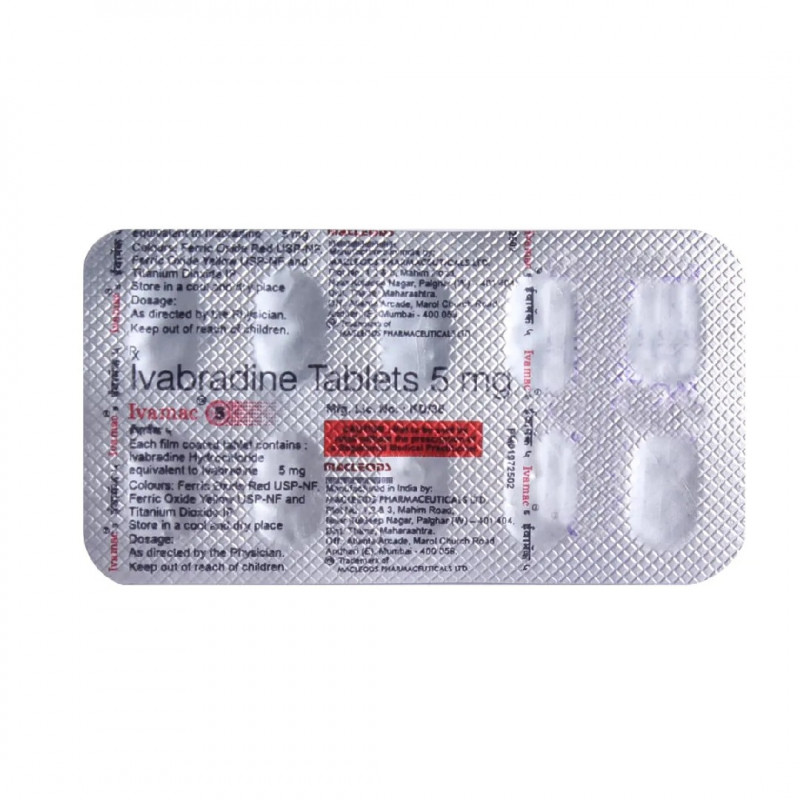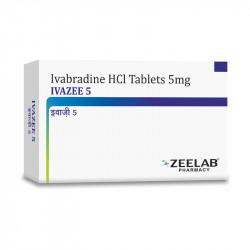Download India's most affordable pharmacy app
- Compare with medicine prices
- Save upto 90% on your medicine bills
COMPOSITION:
Ivabradine (5mg)DESCRIPTION:
Ivamac 5 Tablet contains Ivabradine (5mg), a medication primarily used to treat heart conditions. It works by lowering the heart rate, which helps to manage conditions like chronic heart failure and angina (chest pain). By reducing the heart rate, Ivamac improves heart function, providing relief from symptoms and preventing further complications. This medication is often prescribed when other heart medications are not effective or suitable for the patient.
Uses of Ivamac 5 Tablet
- Treats chronic heart failure to improve heart function.
- Reduces the frequency of angina (chest pain) in adults.
- Helps manage high heart rate in patients with certain heart conditions.
How Ivamac 5 Tablet Works
Ivamac contains Ivabradine, which works by inhibiting a specific channel in the heart that controls the heart's pacemaker activity. This reduces the heart rate, allowing the heart to pump more effectively. By lowering the heart rate, Ivamac helps reduce the workload on the heart and prevents angina or heart failure symptoms from worsening.
Benefits of Ivamac 5 Tablet
- Improves heart function in patients with chronic heart failure.
- Reduces the frequency and severity of angina attacks.
- Helps manage heart conditions by lowering the heart rate.
- Decreases the risk of further heart complications and hospitalizations.
How to Take Ivamac 5 Tablet
Ivamac 5 Tablet should be taken as prescribed by your doctor. The usual dose is one tablet twice daily, taken with food. Swallow the tablet whole with water. Do not chew, crush, or break the tablet. If you miss a dose, take it as soon as you remember, unless it's close to your next dose. In that case, skip the missed dose and continue with your regular schedule. Do not take two doses at once.
Side Effects of Ivamac 5 Tablet
- Common side effects include headache, dizziness, and fatigue.
- Severe side effects may include slow heart rate (bradycardia), visual disturbances (temporary), and irregular heartbeat.
- Rashes, nausea, and gastrointestinal issues are also possible.
- If you experience any severe side effects, such as fainting or difficulty breathing, seek medical attention immediately.
Safety Advice
Before using Ivamac, inform your doctor if you have a history of heart conditions, liver problems, or vision disorders. Ivamac is not recommended for use in patients with severe heart conditions or in combination with other medications that affect heart rate. Pregnant or breastfeeding women should consult their healthcare provider before using Ivamac. Always follow the prescribed dosage and avoid stopping the medication suddenly without your doctor’s guidance.
Frequently Asked Questions (FAQs)
Q: How does Ivamac help in chronic heart failure?
A: Ivamac helps reduce the heart rate, reducing the workload on the heart. This allows the heart to function more efficiently, improving symptoms of chronic heart failure and preventing further complications.
Q: Can Ivamac be used to treat all types of heart conditions?
A: Ivamac is primarily used to treat chronic heart failure and angina. It may not be suitable for all heart conditions, so it's important to follow your doctor’s guidance for its use.
Q: What should I do if I miss a dose of Ivamac?
A: If you miss a dose of Ivamac, take it as soon as you remember, unless it's almost time for your next dose. In that case, skip the missed dose and continue with your regular schedule. Do not take two doses to make up for a missed one.
Q: Can I drink alcohol while taking Ivamac?
A: It’s advisable to limit alcohol consumption while taking Ivamac, as alcohol can increase the risk of side effects like dizziness and low blood pressure.
Q: Is Ivamac safe for long-term use?
A: Ivamac is generally safe for long-term use when taken as prescribed. However, regular follow-up appointments with your healthcare provider are important to monitor heart function and adjust dosages if needed.








 Added!
Added!